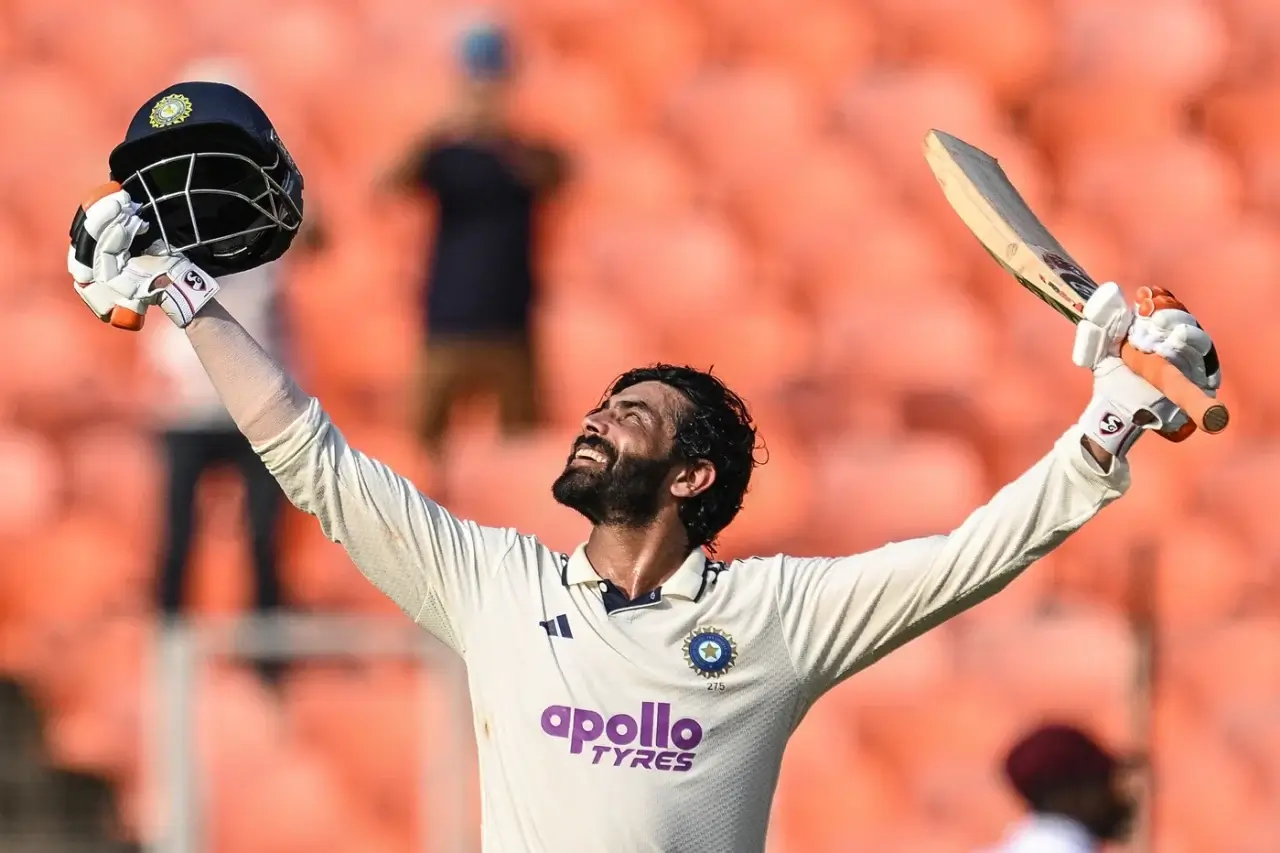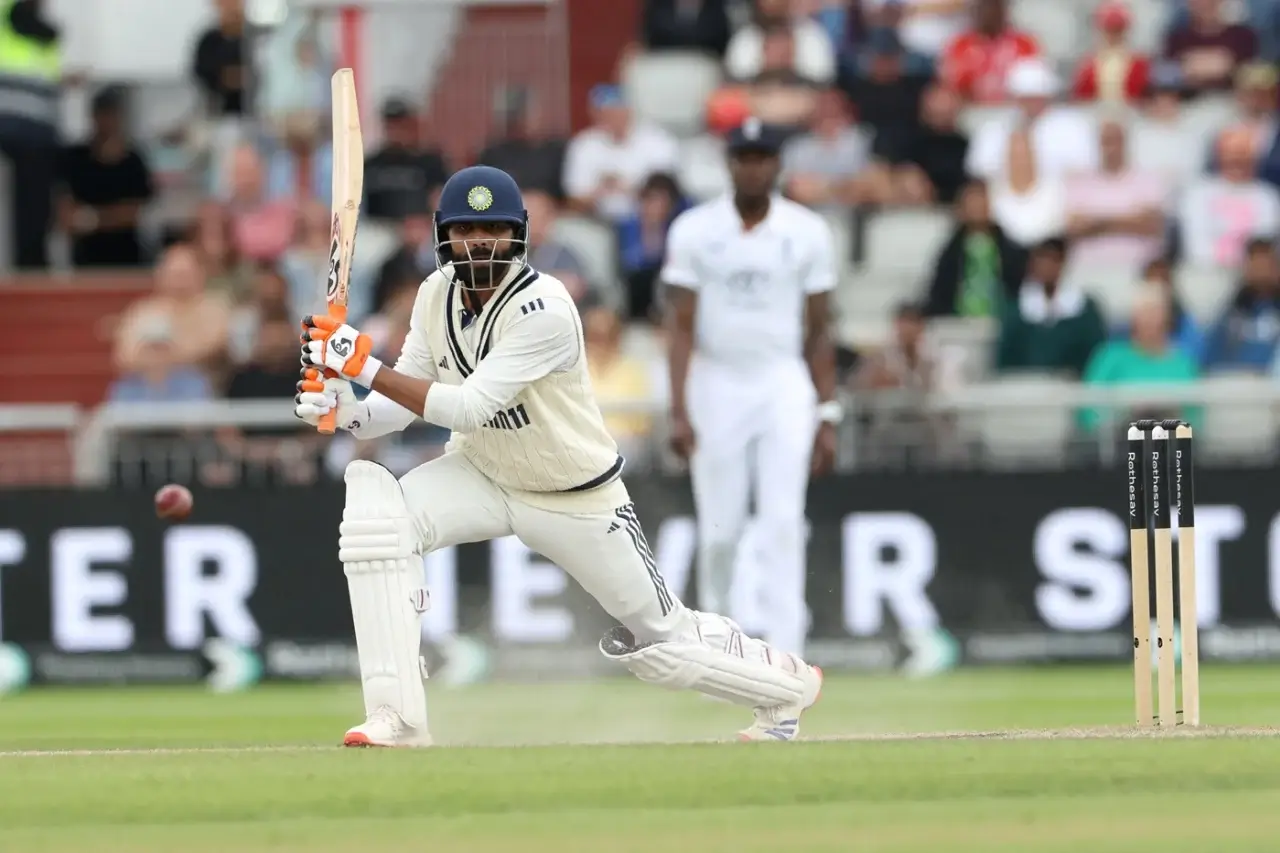India walk into the final day in Guwahati with their backs against the wall. They trail this two-Test series 1-0, and their chances of saving the final match look extremely slim. A target of 549 sits towering above them, and they already find themselves 27 for 2. The odds are brutal, yet Ravindra Jadeja believes there is still something meaningful to chase.
For Jadeja, batting out the full fifth day would be a moral victory. It might not change the result of the series, but it can restore belief in a team navigating a difficult transition phase. India have not faced back-to-back home series losses for over a decade. The last whitewash came against New Zealand last year, and that defeat still hangs heavy in conversations.
Jadeja explained that survival requires calm defence and smart rhythm. He emphasised trusting technique, absorbing pressure, and playing session by session. His message felt clear: win small battles before worrying about the final scoreboard. The idea of a moral victory is unusual in India’s cricket culture, yet this moment demands honest expectations.
This Test also highlights India’s shift from a twelve-year period of dominance. Younger batters now carry bigger roles. Senior players face new combinations. And a team once unbeatable at home now confronts challenges more frequently. Jadeja believes these experiences build stronger futures. His final-day message stands as a reminder that resolve under pressure shapes champions more than perfect scorecards.
Jadeja’s Call for Patience and Mental Toughness
Jadeja understands that India cannot chase 549 under these conditions. So he turns the team’s focus toward survival, clarity, and application. His plan begins with one demand: no early wickets in the morning session. He explains that a wicket-free phase will place real pressure on South Africa. Bowlers then feel urgency, not dominance. That switch in mindset can change the entire day.
He also highlights the importance of trusting defensive technique. He wants batters to commit fully to their footwork and judgment. In tough conditions, hesitation creates mistakes faster than turn or bounce. Jadeja’s simple message helps younger players understand that control begins in the mind long before it reaches the bat face.
Jadeja knows Guwahati’s pitch will grow unpredictable. The ball may turn sharply, bounce unevenly, or stay low without warning. He asks batsmen to accept these risks without panic. The key lies in calm reactions, not aggressive counters. This approach reflects the essence of fourth-innings Test batting.
For Jadeja, a full-day block would feel like a win. He believes such an escape would build confidence for the next home cycle. India rarely talk about draws this way, but the situation demands honest goals. Tomorrow becomes less about the series and more about character growth.
Why Jadeja Values a Moral Victory in This Moment?
Jadeja has lived through India’s best home years. He bowled in dominant wins and watched top orders score freely. He knows how stability feels. This is why the present phase hits differently. India is rebuilding, and young players carry heavy expectations early.
A successful escape from South Africa becomes a lesson in resilience. It shows the group that surviving tough days matters as much as scoring big. It also teaches them how to handle pressure in the fourth innings with maturity. Jadeja believes this experience can shape India’s future. A hard-fought draw can teach more than an easy win.
The Toss, Timing, and How Luck Shaped This Series
Jadeja was clear about one major factor: the toss. He insisted that winning tosses on Indian surfaces often determines early control. In 2019, India won all three tosses and dominated South Africa easily. But in this series, South Africa won both tosses and used first-innings conditions perfectly.
The pitch in Guwahati looked flat and friendly on day one. South Africa cashed in and reached a strong total before the surface offered anything to the bowlers. By the time India batted, the ball had begun to grip slightly, and scoreboard pressure intensified. This pattern repeated across both Tests.
Jadeja acknowledges that pitches at home often reward the side batting first. He explains that even great bowlers look ordinary on lifeless opening-day wickets. The moment a team earns a 300-run cushion, everything shifts. Batters can play freely. Bowlers can attack. Captains can set aggressive fields.
Jadeja insists that India must adapt better when conditions run against them. But he also reminds critics that the game’s timing shapes every narrative. The difference between dominance and pressure can be as small as calling right at the toss.
Why First-Innings Advantage Matters in India?
India’s home success has relied heavily on strong first-innings totals. Their spinners thrive when runs support them. Batters feel secure when they control the tempo early. Opponents struggle when they chase from behind.
When this pattern flips, India’s comfort disappears. Jadeja says bowlers lose impact when pitches look flat. Batters face more fear when chasing huge totals. The mental balance changes instantly.
This is why he believes winning tosses shaped this series more than tactical mistakes.
India’s Transition and Jadeja’s Message to Young Players
India are in a transition phase that demands patience. Several senior batters have stepped away. New players fill positions that once came with stable expectations. Each mistake receives amplified scrutiny, especially at home. Jadeja believes this environment feels harsher because fans assume home wins should arrive automatically.
He defends the younger group strongly. He says international cricket always presents a challenge to newcomers. Conditions vary. Pressure builds quickly. And opponents no longer fear touring India. South Africa, New Zealand, and England now arrive prepared for turning pitches and high-pressure sessions.
Jadeja reminds the team that losses often create growth. Winning streaks hide weaknesses. Defeats highlight them early. These lessons help new players mature faster. A tough series teaches more than a predictable home victory.
He urges youngsters to accept conditions without complaints. He encourages them to play with passion, learn from their mistakes, and remain calm under pressure. For Jadeja, the value lies not in the scoreboard but in the maturity gained across difficult situations. Tomorrow becomes a classroom for India’s future core.
Why This Phase Could Strengthen India Long-Term?
Jadeja sees long-term benefit in tough home series. Youngsters learn how to defend under pressure. They understand patience. They develop quiet confidence. These lessons cannot come from easy wins.
India’s next generation will later value this experience. When they control future matches, they will recall days like Guwahati. They will remember how to fight, survive, and stay calm. This phase builds mental steel for India’s long-term success.
Conclusion
India step into day five with a mountain in front of them. A chase of 549 remains unrealistic, but survival holds deeper meaning. Jadeja’s message shifts focus away from the scoreboard. Instead, it highlights character, commitment, and resilience. A draw here may not change the series result, but it can restore clarity and confidence.
India’s troubles cannot be separated from circumstances. South Africa won the key tosses. Conditions supported their strengths. India’s young players faced unfamiliar pressure. These factors created a rare home struggle, not a permanent decline.
Jadeja’s honesty reflects a player who understands cycles in cricket. He knows India’s twelve-year dominance set unrealistic expectations. He believes this defeat will broaden the mindset of the next generation. Young players will understand the real toughness of Test cricket. They will grow from this moment.
Day five becomes more about attitude than runs. India must fight for every ball. They must trust technique. They must slow the match, not chase miracles. Survival becomes a goal worth celebrating because it rebuilds belief.
In many ways, this final day is the true turning point of the series. Not for the result, but for the foundation it lays. Jadeja hopes India embrace this challenge with courage. If they bat through, it may not be a win on paper—yet it will feel like one.




